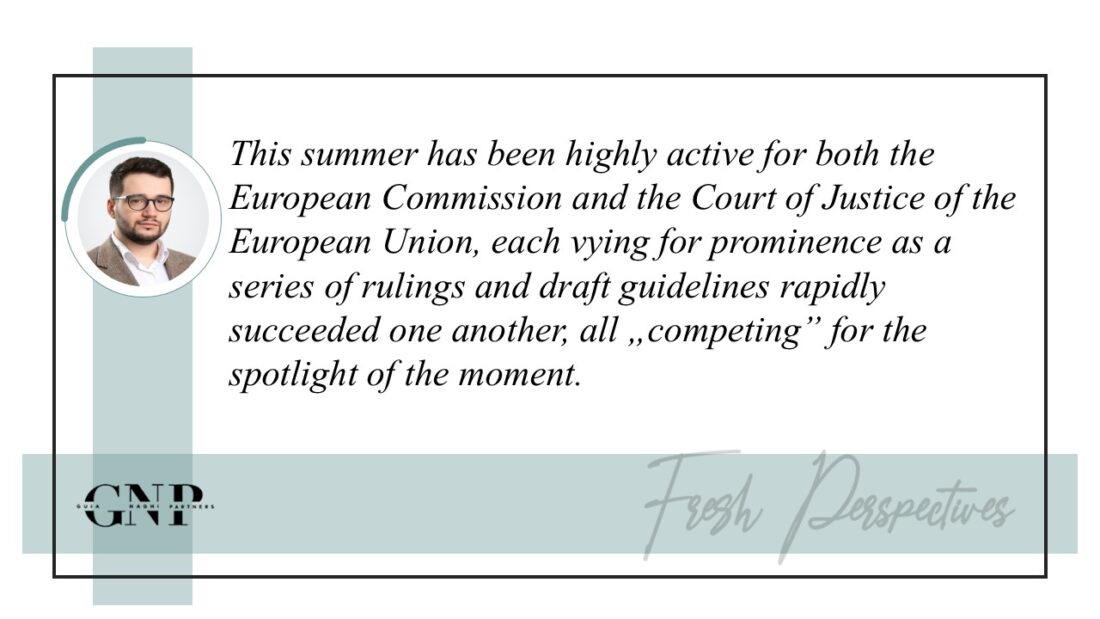Tudor Pasat – While on trial with the tech titans, the EC is also sharpening its tools
To begin with, this summer has been particularly active and dynamic for competition law enthusiasts and practitioners, marked by a wave of new approaches and perspectives from both the CJEU and the European Commission. Notably, the primary focus appears to center the digital and tech industries, as all the key developments share a common thread: they each pertain to, or significantly impact, the way we will approach digital platforms and the tech sector, especially in cases involving dominance matters.
That being said, even though summer has passed, I believe the following highlights from recent months are essential readings for every competition law practitioner and enthusiast.
Case C-48/22 P – Google Shopping saga has finally come to an end
In a nutshell, the Commission concluded in 2017 that Google had abused its dominant position by promoting its own product (i.e. Google Shopping), while downgrading competing comparison-shopping services in organic search results. This preferential treatment, involving discriminatory practices, did not strictly align with traditional dominance case – law established infringements, such as refusal to deal, tying, bundling, or discrimination. After gathering a considerable amount of evidence in supporting that Google’s conduct increased Google Shopping’s traffic and, consequently, revenue, the Commission concluded that Google altered competition on the merits on the relevant market.
The case triggered a lot of debate and analysis in the competition law bubble, which, ended with the birth of a new, standalone infringement which we now call self – preferencing. Although introduced in 2021 as a viable theory of harm, the 2024 decision ends the debate, making it clear and definitive that self-preferencing amounts to a stand – alone infringement of article 102 of the TFEU.
The relevance of the ruling is undisputed, also considering that some National Competition Authorities („NCAs”) have already launched investigations against other platforms on grounds of self – preferencing conduct[1].
Case C-246/23 – Booking.com’s MFNs do not pass the legal test
The problems at stake originate in 2015, when Bundeskartellamt stated that narrow price parity clauses put in place by Booking[2] have been in breach of art. 101 TFEU. Within the context of the national judicial review of the decision, the CJEU has been asked to rule upon two major aspects of the business model, respectively (i) if wide and narrow parity clauses can consider an ancillary restriction in the context of art. 101 TFEU, and (ii) how should the relevant market be defined when transactions are mediated by an online travel agency platform (such as Booking.com).
Concerning findings of the court, it is mainly the market definition assessment that is rather interesting, as the CJEU provides that substitutability from a supply and demand point must consider not only on-line intermediation services, but also all other sales channels available at hand. On the other matter at stake, as anticipated (?) by AG Collins in its opinion, price party clauses, whether narrow nor wide, cannot amount to ancillary restraints (and thus, not be sanctioned), as they do not meet the criteria of indispensability and proportionality, by reference to the economic viability of the platform itself.
The European Commission’s Exclusionary Abuses of Dominance Guidelines draft is the new black
Continuing its endeavour to update all the analysis tools at hand, EC has launched a public consultation its draft Guidelines on Exclusionary Abuses in August 2024, guidelines which have not been updated since the 2008 Guidance Paper on Enforcement Priorities for Exclusionary Abuses (the 2008 Guidelines).
As expected, the draft Guidelines flies around established case – law. However, the document provides significant quantitative and qualitative change of both structural and textual approach, compared to its old predecessor, the 2008 Guidelines.
First, the draft Guidelines introduce a two – step test in establishing whether the conduct asseset may constitute an abuse, respectively (i) does conduct departs from competition on the merits, and(ii) does the conduct has the capacity to generate exclusionary effects. However, this test is not infailable, the parties under investigation having the right to prove that the conduct is counter – balanced and/or outweighed by advantages or that it is objectively justified.
Second, and as a major departure endeavour from the 2008 Guidelines, the draft Guidelines seek to categorise conducts into three main distinct classes. What is highly important to consider is that, although for the first class of conducts, the test must be fully addressed by the EC, when it comes to the two latter classes, the EC introduces a series of presumptions when it comes to both the existence of the exclusionary effects and the departure from competition on the merits.
Having in mind the distinction, the 2nd and 3rd categories can be summarised as following.
Second Category applies to (i) exclusive supply or purchasing agreements, (ii) exclusivity rebates; (iii) predatory pricing; (iv) margin squeeze, and (v) tying (not all forms of tying are covered). Regarding these acts, the Commission seeks to impose that only the conduct must be proven to presume that exclusionary effects have taken place.
Third Category applies to naked restrictions (suchpay – for – delay acts). Regarding these categories of acts, the Commission provides that, as a rule, no economic interest may arise in such situations and that only in exceptional circumstances the investigated undertakings would be able to rebut the presumptions.
Although not surprising, the Commission appears to seek to dismantle, the effect – based analysis approach established by recent CJEU case law which seems to be a later trend at judicial level. This objective is pursued by not only setting up a presumption – based approach for certain conduct, but also by drifting away from the consumer – harm theory, with the ultimate purpose of seeking to alleviate the burden of proof incumbent on the Commission.
[1] In february 2024, the Dutch Authority for Consumer & Markets has launched an investigation into an online platform over concerns of self – preferencing and discrimination in favour of it’s own products.
[2] It is important to bear in mind that wide price parity clauses have been replaced by narrow parity clauses by Booking in 2015, after consultations with the Italian, Swedish and French NCAs.





No Comments